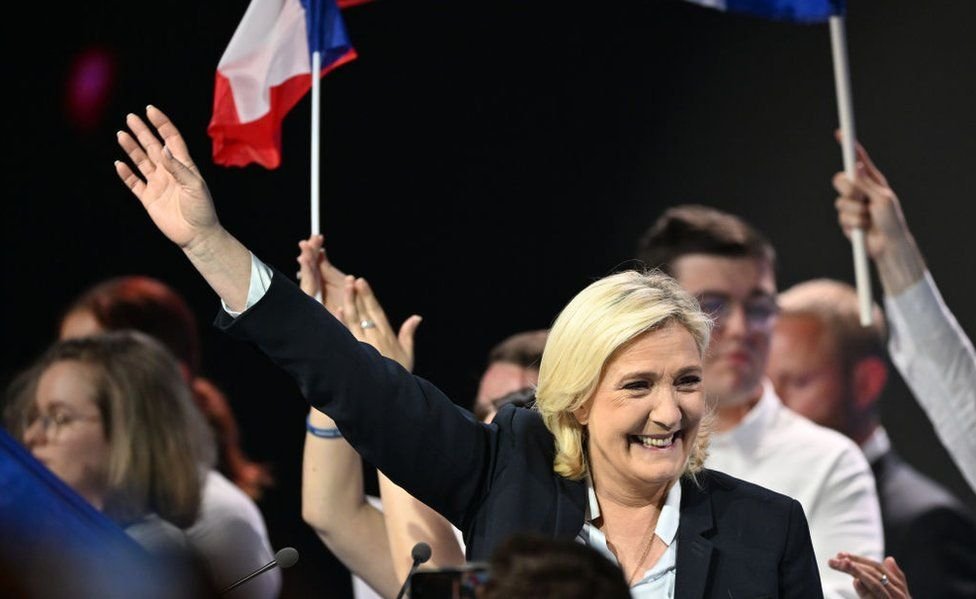Rise of the Far-Right in France in recent opinion polls ,marks a notable shift in the political landscape. This development , reflecting growing discontent with traditional parties and changing voter priorities. The rise of the far-right, particularly Marine Le Pen’s National Rally has significant implications for the upcoming elections, potentially reshaping France’s political future.
Marine Le Pen’s National Rally has seen increasing support in recent opinion polls. Factors contributing to this rise include concerns over immigration, national identity, and dissatisfaction with the current government’s handling of economic issues. Le Pen’s party has capitalized on these sentiments, presenting itself as a defender of French values and a solution to the perceived failures of the mainstream political establishment.
Key Issues Driving Support
- Immigration and National Identity: Immigration remains a contentious issue in France. Le Pen’s party has taken a hardline stance, advocating for stricter immigration controls and policies to preserve French cultural identity. This position resonates with a significant portion of the electorate concerned about cultural changes and security.
- Economic Concerns: Economic stagnation and unemployment, particularly among the youth, have led to widespread dissatisfaction. The far-right promises economic reforms, job creation, and protectionist measures to revive the economy. These promises appeal to voters feeling left behind by globalization and economic policies favoring big businesses.
- Security and Terrorism: Ongoing concerns about terrorism and crime have also bolstered support for the far-right. The National Rally emphasizes a strong law-and-order approach, advocating for increased funding for police and military forces and tougher measures against terrorism.
The surge in support for the far-right poses a significant challenge to traditional parties, both on the left and the right. The mainstream parties, including President Emmanuel Macron’s La République En Marche (LREM) and the center-right Republicans (Les Républicains), face declining support. Many voters perceive these parties as out of touch with their concerns and ineffective in addressing pressing issues.
President Macron, who emerged as a centrist alternative in the 2017 election, now faces a more polarized political environment. His government’s handling of the COVID-19 pandemic, economic policies, and social reforms have received mixed reactions. While Macron maintains a base of support, the rise of the far-right represents a significant threat to his re-election prospects. Macron has attempted to counter this by adopting tougher stances on immigration and security, but it remains uncertain whether this will be enough to sway voters.
The growing support for the far-right could lead to several potential scenarios in the upcoming elections:
- Far-Right Victory: If current trends continue, the National Rally could win a significant portion of the vote, potentially leading to a first-round victory for Le Pen in the presidential election. A far-right victory would mark a historic shift in French politics, with potential implications for France’s position in the European Union and its domestic policies.
- Runoff Election: In the likely event of a runoff, Macron could face Le Pen in a repeat of the 2017 election. However, the dynamics have changed, and the outcome is far from certain. Macron would need to consolidate support from centrist and left-leaning voters, while Le Pen would aim to attract disillusioned voters from across the political spectrum.
- Coalition Government: The rise of the far-right could also lead to a more fragmented political landscape, making it difficult for any single party to secure a majority. This scenario could result in a coalition government, with traditional parties having to navigate alliances and compromises to govern effectively.
The rise of the far-right in France reflects broader trends seen in other parts of Europe and the world. Increasing polarization, economic uncertainty, and cultural anxieties are driving voters towards more extreme political options. The outcome of the French elections will not only shape the country’s future but also have implications for the European Union and global politics.
The far-right’s lead in opinion polls marks a significant shift in the French political landscape. Issues like immigration, economic concerns, and security are driving this change, challenging traditional parties and President Macron’s administration. The upcoming elections could result in a historic shift for France, with potential far-reaching consequences. As the political climate evolves, the far-right’s rise highlights the deep-seated concerns and divisions within French society.





Leave a Reply